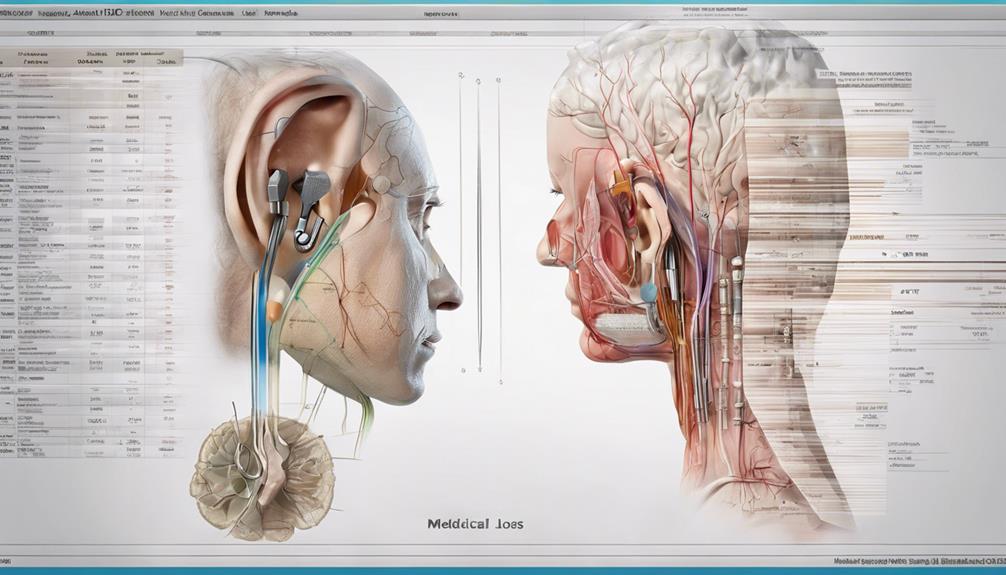Imagine a scenario where a patient suddenly loses their hearing upon arrival, prompting a healthcare provider to assign an ICD-10 code for accurate documentation.
However, the complexity of hearing loss classifications can sometimes pose challenges in selecting the appropriate code. Understanding the nuances of ICD coding for hearing loss is crucial not only for precise diagnosis but also for effective treatment planning and reimbursement.
In this guide, we will explore the intricacies of ICD codes related to hearing loss and how mastering them can significantly impact patient care and healthcare outcomes.
Key Takeaways
- Accurate ICD coding enhances tailored interventions and treatment monitoring for hearing loss.
- Proper documentation with specific codes streamlines healthcare processes and improves patient outcomes.
- Consistent use of ICD codes aids in tracking prevalence and impact of hearing impairments.
- Understanding different types of hearing loss ICD codes is crucial for precise diagnosis and treatment planning.
Importance of ICD Codes for Hearing Loss
Understanding the importance of ICD codes for hearing loss is fundamental in ensuring accurate diagnosis and effective treatment planning in healthcare settings. The Hearing Loss ICD, specifically ICD-10 codes H90 and H91, play a pivotal role in categorizing different types of hearing impairments. These codes offer detailed classification options that aid audiologists in pinpointing the specific type of hearing loss a patient may be experiencing. By accurately documenting the type of hearing loss using ICD-10 codes, healthcare providers can tailor interventions to address the unique needs of each individual, ultimately leading to improved patient outcomes.
Moreover, the utilization of Hearing Loss ICD codes enhances the monitoring of treatment progress and ensures that patients receive appropriate care. Through the systematic documentation enabled by ICD codes, healthcare professionals can track changes in a patient's hearing status over time, enabling them to make informed decisions regarding the efficacy of treatments and interventions. This detailed classification system streamlines healthcare processes, reduces errors, and optimizes patient care by providing a standardized framework for understanding and addressing hearing loss.
Classification of Hearing Loss ICD Codes

Within the classification of Hearing Loss ICD codes, the subcategory H90-H94 encompasses a range of disorders specifically related to the ear. These codes are vital for accurately documenting and diagnosing various types of hearing impairments.
Among these codes, specific differentiations are made for conductive hearing loss, which occurs due to problems in the ear canal, eardrum, or middle ear, and sensorineural hearing loss, which results from damage to the inner ear or auditory nerve.
The recent updates in ICD-10 include codes that allow for the detailed classification of unilateral (affecting one ear) and bilateral (affecting both ears) hearing loss. Proper documentation of the type and laterality of hearing loss is crucial for selecting the appropriate ICD code, enabling healthcare providers to develop tailored treatment plans.
Utilization of ICD Codes in Medical Records

Proper utilization of ICD codes in medical records is essential for accurately documenting and tracking the type and severity of hearing impairment. Healthcare providers rely on these codes to ensure consistent diagnosis and treatment planning for individuals with hearing loss. Moreover, ICD codes play a vital role in tracking the prevalence and impact of hearing loss within patient populations, enabling targeted interventions and improved outcomes. To illustrate the significance of utilizing ICD codes in medical records effectively, the table below showcases examples of commonly used ICD codes for different types of hearing loss:
| Type of Hearing Loss | ICD-10-CM Code | Description |
|---|---|---|
| Conductive | H90.3 | Conductive hearing loss, unspecified ear |
| Sensorineural | H90.1 | Sensorineural hearing loss, unilateral |
| Mixed | H90.5 | Mixed conductive and sensorineural |
| Unspecified | H91.9 | Unspecified hearing loss |
Billing Procedures for Hearing Loss ICD Codes

When billing for hearing loss, healthcare providers must accurately assign ICD codes under the H90-H94 subcategories to ensure precise documentation and reimbursement. The ICD-10 coding system offers specific codes such as H90.0 for bilateral conductive hearing loss, H90.1 for unilateral conductive hearing loss, and H90.3 for sensorineural hearing loss. Each code corresponds to a particular type of hearing impairment, aiding in the correct diagnosis and treatment planning for patients.
Proper documentation and accurate coding are crucial not only for billing purposes but also for enhancing healthcare delivery by facilitating clear communication among healthcare professionals. By utilizing the appropriate ICD codes for hearing loss in medical billing, providers can streamline the reimbursement process and contribute to improved patient care outcomes.
Understanding the nuances of these codes allows for a more efficient and effective management of hearing-related conditions within the healthcare system.
Understanding Different Types of Hearing Loss

Differentiating between various types of hearing loss is essential for accurate diagnosis and treatment planning in healthcare. When it comes to understanding different types of hearing loss, it's crucial to consider the following:
- Conductive Hearing Loss (H90.0-H90.2): This type of hearing loss is characterized by issues in the outer or middle ear that affect the conduction of sound waves.
- Sensorineural Hearing Loss (H90.3-H90.4): Sensorineural hearing loss involves damage to the inner ear or auditory nerve, leading to difficulties in transmitting sound signals to the brain.
- Mixed hearing loss: Mixed hearing loss combines elements of both conductive and sensorineural hearing loss, impacting both the conduction of sound and the processing of signals.
Understanding these distinctions and recognizing the corresponding ICD-10 codes is fundamental for healthcare professionals to provide accurate diagnoses and develop effective treatment plans for individuals experiencing hearing difficulties.
Frequently Asked Questions
What Is the ICD-10 Code for Hearing Loss?
We use the ICD-10 code to classify hearing loss in medical records. The code for hearing loss varies based on the type and laterality.
For instance, bilateral conductive hearing loss is represented by H90.0, while unilateral sensorineural hearing loss is coded as H90.4.
It's important to accurately assign the correct ICD-10 code to ensure proper documentation and treatment for patients with hearing impairments.
What Is the ICD-10 Code for Comprehensive Hearing Test?
The ICD-10 code for a comprehensive hearing test is Z01.10. This code documents the completion of a thorough assessment without abnormal findings. It's crucial for accurate medical coding and billing for hearing evaluation services.
Healthcare providers utilize Z01.10 to report routine hearing tests and screenings. It signifies the performance of a detailed examination but doesn't specify the test results. Using this code ensures proper documentation and reimbursement for these services.
What Is the ICD-10 Code for Z46 1?
We use Z46.1 as the ICD-10 code for Encounter for fitting and adjustment of a hearing aid. This code is crucial for documenting and billing visits related to hearing aid services.
Healthcare providers rely on Z46.1 to manage and track encounters specifically for hearing aid fittings. Accurate use of this code ensures proper reimbursement and facilitates smooth management of patient care in the context of hearing aid adjustments.
What Is the ICD-10 Code for H90 A21?
We use the ICD-10 code H90 A21 to classify bilateral sensorineural hearing loss affecting both ears. This code accurately documents cases of sensorineural hearing loss and guides treatment planning.
Understanding the nuances of this code is crucial for managing bilateral sensorineural hearing loss effectively. Ensure precise diagnosis and care by utilizing the H90 A21 code for cases of hearing loss impacting both ears due to sensorineural causes.
Conclusion
In conclusion, accurate coding of hearing loss using ICD-10 is crucial for proper diagnosis and treatment planning. Understanding the classification and utilization of these codes in medical records is essential for efficient billing procedures and quality reporting.
But have you ever wondered how standardized coding processes can revolutionize patient care and streamline healthcare provision?









